The Significance of Police Training in Professional Community Service
6/9/20251 min read


Understanding Police Training
Police training serves as a critical component in the development of effective law enforcement professionals. It encompasses a wide array of training modules designed to equip officers with the skills necessary to address various challenges encountered in the line of duty. From physical conditioning and firearms training to conflict resolution and community engagement, a well-rounded training program emphasizes the importance of professionalism in serving the community.
The Role of Training in Building Community Trust
One of the primary objectives of police training is to foster trust between law enforcement agencies and the communities they serve. Officers who undergo comprehensive training are better prepared to handle sensitive situations with empathy and understanding. This capability not only enhances their response to incidents but also helps to build rapport with community members. Trust is fostered when police officers demonstrate professionalism, making informed decisions based on the principles taught during their training.
Continuous Improvement Through Advanced Training
Police training is not a one-time event; rather, it is an ongoing process that evolves in response to societal needs and concerns. Advanced training programs, including workshops and seminars focused on emerging issues—such as mental health crises and community policing—are essential for maintaining an effective and responsive law enforcement team. By investing in continual education, police departments can ensure that their officers remain adept at serving the community professionally and effectively.
In summary, the importance of police training cannot be overstated. It lays the foundation for officers to perform their duties with integrity, fosters community trust, and supports the lifelong learning necessary to adapt to the ever-changing landscape of law enforcement. A well-trained police force is not only beneficial for the officers themselves but also for the communities they are dedicated to protecting and serving.
